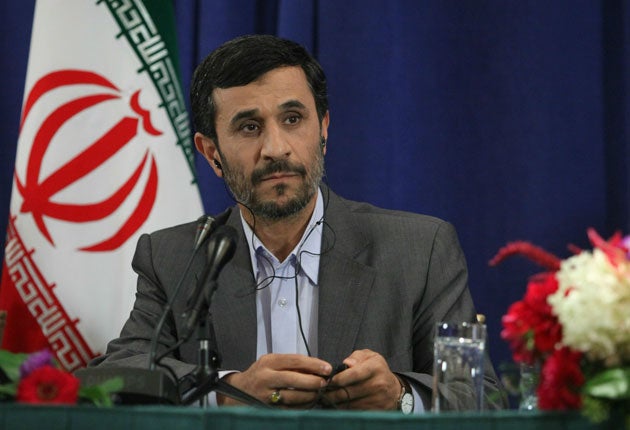Iran defiant over secret nuclear facility
While Britain looks for a diplomatic solution, the US is threatening sanctions and won't rule out military action

In an atmosphere beginning to seem increasingly like a brinkmanship contest, Iran and the rest of the world exchanged pugnacious messages yesterday over the nation's burgeoning nuclear capability, and the threat it poses to non-proliferation.
Following the revelation in the past 48 hours that Iran has a second, underground and hitherto secret uranium enrichment plant, the US President, Barack Obama, added yesterday to his warning that Tehran risked "sanctions that bite". In his weekly radio and internet address, he said evidence that shows Iran is building an underground plant to enrich uranium which could be used for an atomic bomb "continues a disturbing pattern of Iranian evasion" that jeopardises global non-proliferation.
The chief option is tougher economic sanctions, but on Friday Mr Obama and administration officials did not rule out military action. "My offer of a serious, meaningful dialogue to resolve this issue remains open," the president said. "But Iran must now co-operate fully with the International Atomic Energy Agency, and take action to demonstrate its peaceful intentions."
Iran immediately responded, voicing defiance. A senior official in the office of Supreme Leader Ayatollah Ali Khamenei said the facility would soon be operational and would make "enemies blind". However, Iran insisted that there had been no attempt to hide the facility, and its nuclear chief said his country will allow the UN nuclear agency to inspect the still-unfinished plant. Ali Akbar Salehi did not specify when inspectors from the International Atomic Energy Agency could visit the site. He says the timing will be worked out with the UN watchdog. And, in a further indication of the febrile mood, Iran's elite Revolutionary Guards announced late yesterday that they will stage missile defence exercises today.
Meanwhile, Israel's response to the crisis was characteristically implacable. The Foreign Minister, Avigdor Lieberman, said yesterday the second nuclear facility was proof that the Islamic Republic was seeking nuclear weapons, and called on the world for an "unequivocal" response. He said: "I spoke this weekend to experts from the East and West. No one has any doubt, according to the technical data that was published, it's a military core." Israeli leaders have repeatedly expressed alarm over Iran's nuclear ambitions and refused to rule out pre-emptive military action to stop Iran from developing an atomic weapon.
This may all be posturing ahead of Thursday's meeting on the issue – to be attended by the UN Security Council members, plus Germany – but yesterday only Britain's Foreign Secretary was trying to cool things down. While David Miliband declined to say that military action was "inconceivable", he told the BBC that Britain was "100 per cent committed" to finding a diplomatic solution.
So far, most of the Security Council have said they are in favour of sanctions against Iran if no accommodation can be reached, with China not yet being on board. But there may be movement on that. A senior US administration source said on Friday: "We've been consulting with the Chinese in the last 24 and 48 hours ... China is just now fully absorbing these latest revelations. I think we should stay tuned for their position in the coming days."
Iran's newly revealed site is said to be in the arid mountains near the holy city of Qom, inside a heavily guarded, underground facility. The pilot plant will house 3,000 centrifuges that could soon produce nuclear fuel – or the payload for atomic warheads. US and British intelligence became aware of it in 2006. The senior US administration source said: "We've been aware of this facility for several years. We've been watching the construction; we've been building up a case so that we were sure we had very strong evidence – irrefutable evidence – that the intent of this facility was as an enrichment plant."
Expert opinion seemed to be divided yesterday on whether – and how soon – Iran could produce a nuclear device. Mark Fitzpatrick from the International Institute for Strategic Studies said the regime could have secret facilities for making warheads. He said: "If they decided today to go for a nuclear weapon and they didn't care about anybody knowing about it, it's possible they could do it in a year. Probably longer, but if all the steps went like clockwork then maybe a year. It's likely that they have some secret facilities and how far along they are in those facilities is a guess."
Professor Paul Rogers from the University of Bradford said the facility is significant because it is underground. He said this signalled a desire to have the capability to make weapons, but he believes that would take about three years. He said: "If Iran were to withdraw from the non-proliferation treaty – it has to give three months' notice and it would not be subject to inspections – and were to put all its efforts into developing weapons, it would take about three years to develop an arsenal of about six deliverable weapons."
Another option would be to make a basic device that was not viable as a weapon but which proved Tehran had nuclear capability. He said: "It would be a signal that they are one of the big boys." But he added that the uranium ore which Iran uses is contaminated with other heavy metals: "It's not clear that Iran has the domestic capability to produce weapons-grade uranium."
Join our commenting forum
Join thought-provoking conversations, follow other Independent readers and see their replies
Comments